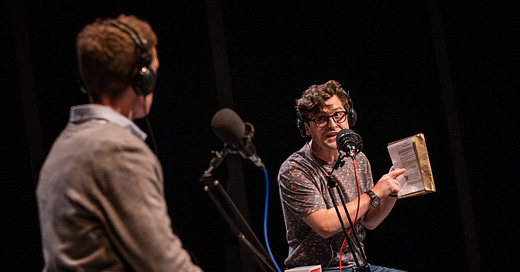Duck Duck Goose: Surveying collateral damage from an agonising rape trial
Caitríona Daly’s sly play follows a man unsure what to believe while his friends are on trial. Photo: Ste Murray
Draoícht, Dublin Theatre Festival
★ ★ ★ ★
Chris Quinn, a welcoming young man working in his father’s business, awakens one morning to find a woman stumbling from his friend Davey’s bedroom. Played by Aidan Moriarty, he assumes she’s shaken from a night of partying. Instead, she cagily begins to ask questions about Davey, who once took an exposing photograph of her and shared it online.
As Fishamble’s absorbing drama gathers Chris and his friends together in a panic, they give accounts of an unintrusive, strange night. Davey insists he didn’t have unconsented sex with her. Could she be plotting revenge for the photograph he took, they wonder? Regardless, they want Chris to delete their WhatsApp group, fearing their bawdy humour might be misunderstood by a wider audience. Boys will be boys.
It may be impossible to push recent history from our minds as, in the meticulous plotting of Caitríona Daly’s script, the locker room talk of the text messages reaches the public, igniting debates about innocence and guilt. Chris - who is at the absolute centre of the play - looks at his phone and sees a message from the woman saying Davey had raped her. Who will he believe?
The plot follows Chris through a series of humiliations while his friends are brought to trial. A sign for the family’s business is spray-painted with “Rapist” when his sister Sarah (a nicely sombre Roseanna Purcell), appalled at her brother’s vulgar part in the leaked text messages, lays out how her career might be doomed by a blemish on the family’s reputation. What we’re getting is a neat survey of collateral damage.
A jury, no less than a society, might be divided by the opposing arguments of a court trial. One scene shows a radio interviewer - on the addictive scent of an exposé in John Doran’s energetic performance - ambushing Chris with a harrowing, incriminating medical report. Another scene allows Liam Heslin’s Davey, who is a picture of modesty, to softly counterargue that the document exists only as part of an imagined, tabloid narrative. (“Do they deserve the death penalty?” he asks, reflecting on men’s lives crushed by the weight of allegation alone).
Not since David Mamet’s wordy, adversarial drama Oleanna might a power struggle over a rape accusation be as ambiguous. References to the dangers of a mob of radical feminists, and to an unreadable oblique woman whose intentions are unclear, all sound like throwbacks to the headache caused by Mamet’s play. But if Oleanna seemed to tilt the table towards the idea that a rape allegation is more dangerous than rape itself, Daly’s sly play doesn’t have the same flare-up.
While the truth of events remains unconfirmed, it feels important that we go where we go. In one affecting scene, Chris grabs a coffee with a woman, played by a compassionate Caitríona Ennis, whose first-date nerves reveal a seriously traumatised individual - a past victim of violence perpetrated in broad daylight, under the unsettling normality of rape culture.
There are ways in which Duck Duck Goose has much in common with a horror story, as echoes of past conversations and reappearances of familiar faces in passing roles are abruptly injected into the story, signalling reckonings that lie ahead. Director Jim Culleton’s straight production doesn’t always go with these impulses, nor does the literalness of Paul Keogan’s set, which is bordered by outlines of gigantic smartphones, give the contemporariness of the script its due. Though Aidan Moriarty, as a shirt-tucked, corn-fed man getting battered scene after scene with reminders that he’s not a bad guy but has poor taste in friends, plays the part, all the way to the disturbing conclusion.
Runs until 9th October.




